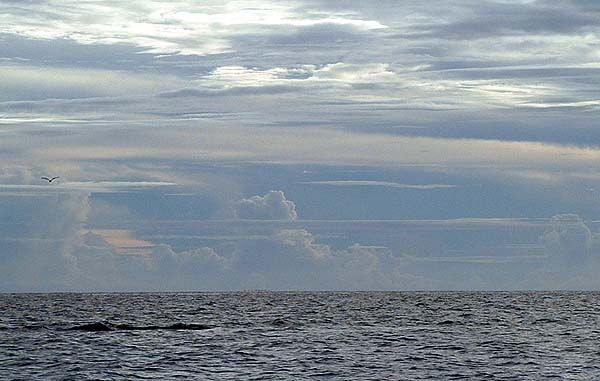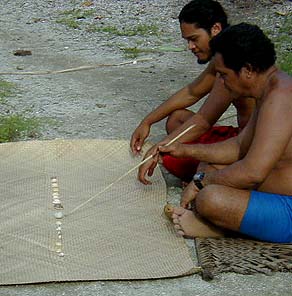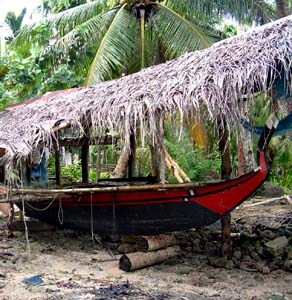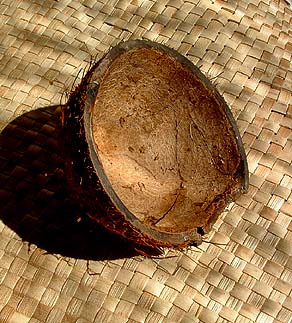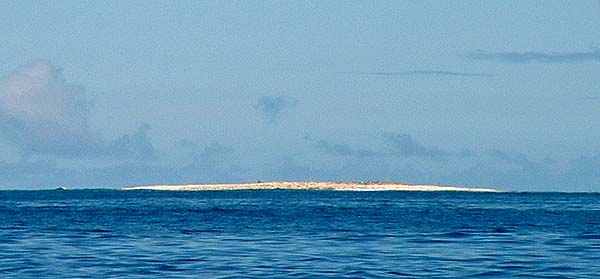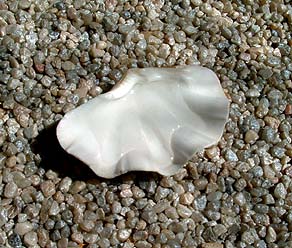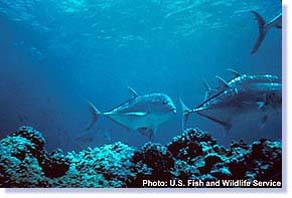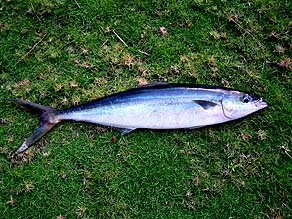 |
 |
 |
|||||
|
|
|
|
|
|
|
|
|
|
|
|||||||
|
|
|
|
|
|
“We have a famous story about Paeliul’ap” Alphonso begins. “Paeliul’ap was reputed to be the master of all traditional skills. That’s why they call him Paeliul’ap because paeliu is the ‘Master Navigator’.” The story starts like this:
|
||
|
|
||
“Paeliul’ap was from Earth, and Isamorel was the daughter of Yol’faaed. Isamorel and Yol’faaed lived in Heaven. Many young men from Heaven came to ask for the hand of Isamorel, but she refused them And they said, ‘Oh, never mind, because she’s waiting for Paeliul’ap.’ They knew about Paeliul’ap, that he was the top navigator on Earth. "But when Isamorel heard about this, she was very mad and felt bad. And so she went to her father, Yol’faaed, crying, and Yol’faaed said, ‘What happened there?’ She said ‘Oh, this is what the boys from Heaven said, that I do not want to marry any of them because I’m waiting for Paeliul’ap to come and get me.’ And he says, ‘Oh, that’s nothing, I can do anything you want'."
|
|
|
“So he took some turmeric leaves, leaves that we use for decoration, and also took some copra, and mixed it up and he made some magic with these leaves. Then he gave it to Isamorel. Now there was a rock coming from Heaven, all the way down to Earth. According to the story, the rock was supposed to be somewhere East of Pohnpei. Yol’faaed told her, ‘Every morning you go down there and take a bath in the sea.’ So she started doing that. “Now Paeliul’ap was a very good navigator and a very good weather man. He used to live in Nan Madol on Pohnpei, and early every morning, he’d go out and read the sky: ‘Is it going to rain today?’
|
|
|
|
|
“Well, when she started taking her baths on the rock in the sea, whenever she was taking a bath, there was like lightening from that rock, and when Paeliul’ap saw that, he was puzzled because he had never seen anything like that in his life. So he decided to go and check, since he was a very good navigator." "So early one morning he started out and sailed toward that rock until he came by. He came and he stopped, and he looked up and Isamorel was sitting there. And he begged her, ‘Please tell me who you are, whether you are a human or you are a ghost.’ “And she said, ‘I’m a human,’ and he said, ‘why did you come down here?’ ‘This is what they told me in Heaven,’ and she told the same story that she told her father. ‘If that’s the case, I’m going to go with you.’ So he abandoned his canoe and went up the rock with her to Heaven."
|
||
|
|
||
“Once they were up there in Heaven, they start having kids. Paeliul’ap started naming his kids after his brothers on Earth, and when they all grew up, the last one was called Yaeliiulwey. We call him 'Yaeliiulwey' in Ulithi, they call him 'Luluei' in Yap. "Now they usually gathered together these kids and started teaching them navigation. While Yaeliiulwey was still in his mother’s tummy, Paeliul’ap used to call his wife and say, ‘come and sit with your back to us so that the child in your tummy can also learn.’ "But when the child was born, he ran away—right up into the jungle and disappeared. So the Paeliul’ap was thinking, ‘Now how am I going to see my son?’ He says, ‘O.K., I’m going to try this.’ So he made a canoe and took it out and anchored it in their sea in Heaven."
|
|
|
"But when Yaeliiulwey came down—that’s the place where he swam—he didn’t like the canoe, so he broke the canoe and went back and hid. “Paeliul’ap made perhaps three or four types of canoe, but Yaeliiulwey did the same thing. The last one was the kind that is used nowadays in Yap, we call it poapoa. That’s the kind that they still use. Yaeliiulwey went down and finally he felt comfortable on the canoe, and that’s when he went back home—he was already a man—and he told them ‘I’m going to travel.’ "So they came and prepared his canoe for travel down to Earth. Yaeliiulwey traveled down until he reached Earth, but instead of traveling to an island, he made his own island, a sand island, with nothing on that island except a piece of the canoe that he made."
|
|
|
|
“Meanwhile, the sons of Paeliul’ap were making a canoe up in Heaven. But there is one of them, the youngest one, that when they brought food, they took all of this bad food and gave it to him. So he was mad, and he went back and told their father, ‘this is what they have been doing to me.’ Paeliul’ap says, ‘now when you sharpen their adzes, instead of sharpening them the way they’re supposed to be sharpened, you sharpen them from the outside.’ "So the boy got the stone for sharpening their tools, and he did that to all of their adzes. Next time when they started carving the canoe, their adze blades, instead of going down, went straight into the canoe! And that’s when they started after him."
|
||
|
|
||
“So his father, Paeliul’ap, said, ‘Go down, go down to Earth,’ and gave him a canoe and sent him down to Earth. And he told him, ‘and there is someone that you have to watch out for, he’s the top navigator who is living on Earth. And you have to break your hammer and all those things. But when you go down there, when you have kids, you name them all after your brothers up here. And you, you’ll take my name.’ "And then he adds ‘whenever you do something, you pray to that man,’—his brother Yaeliiulwey—‘because he’s going to be your navigation god. And when you have, before me, you take a fish and you put it up for him.’ So that’s what they were doing. He came down and did all the things that his father told him."
|
|
"...for Yaeliiulwey."
|
“Now there is another one among the brothers, whose name was Farbay. Farbay had the same kind of mentality as his grand father, who is Yol’faaed. So when he starts eating, instead of giving good food—lets say coconut—he took the thing that holds the coconut and said ‘for Yaeliiulwey.’ And when they ate bananas, he took the peel and said ‘for Yaeliiulwey.’ "Then finally they made a canoe, and they all got up on the canoe and started to sail. And it so happened that they were close to the sand island—they hadn’t seen it yet, but they were close by—when a typhoon hit them, and they were all killed except Farbay. "Farbay started swimming, and when he thought, ‘Ah, I’m going to die,’ then he would feel something come under his feet and he would stand up and take a rest. And when he said, ‘Ah, now I’m O.K.,’ then that support vanished off, and he started swimming again. And when he finally said, ‘I’m going to give up and die,’ that’s when Farbay stepped on to the beach on the sand island."
|
|
|
|
|
“He went up and there was a man making nets. Farbay said, ‘Hey, who are you? I’m hungry!’ He didn’t know that it was his brother Yaeliiulwey, who was still young when he came down. But by then he was older, half ghost, half human. ‘I’m hungry.’ The man says, ‘look there is a piece of taro.’ There was a piece about two inches around, taro pounded with copra, on a piece of leaf, but there was no tree there. ‘This is my only food,” the man said, ‘and if you eat a little bit, leave some for me.’ "Farbay looked at it and said, ‘I’m starving? and this much? I’m going to see what happens.’ So he took it and put it all in his mouth and ate it all. But when he looked down, there was still another one there…until he was full. He took the last one and threw it at the sand, and then the man said, ‘hey, look, that’s the only food we have here'."
|
||
|
|
||
“Now remember that when the brothers would start eating, they were supposed to put aside something for Yaeliiulwey, and Farbay put aside all those bad things. Now all those things that Farbay kept on putting aside, the man said ‘those are my food, why don’t you go ahead and eat?’ People don’t eat those things. ‘But those are the things that you put away for me. So you go ahead and eat it.’ Farbay had been putting aside nothing but bad things, and finally, this is his food, and that’s why there was only a small piece of taro. "Also there was only a little water in a clam shell. And the man said, ‘you drink this, but if you try to do the same thing, we have nothing.’ But Farbay ignored him and just drank until he was satisfied, and put that thing back down."
|
|
|
“Farbay stayed there a couple of months and he started wanting to eat fish. He said, ‘look, I want to eat fish’ and the man says, ‘there is a spear,’—they call it habay, it’s not made out of metal, but wood from the coconut tree—‘there is a spear there. You go look around and spear one.’ So Farbay took the spear and went down and saw one of these skipjacks. He threw the spear and bing! “Then he took some kind of knife and started filleting it. But when he started filleting the fish, the man who was working, one side of him started peeling off. Farbay looked at him and said, ‘what happened?’ The man said, ‘oh, because you’re filleting that fish.’ So Farbay took the fish and threw it in the water again."
|
“Now there are several types of fish that are forbidden for all navigators to eat, even these days. And those are the ones that Farbay’s filleting. So that’s why all those navigators, they don’t eat those kinds of fish, because it’s against the rules of navigation, because of that. And then the last time Farbay went back, he got one of those fish that can be eaten. “And so after that Yaeliiulwey started teaching Farbay about navigation and all those skills for navigation, all the magic and how to read the weather. He taught him all, everything.”
|
|
|
|
|
“This story is from very long ago,” Cal explains, “because it depicts the origins of a lot of our skills—navigation, canoe making, how you can move objects that are greater than you using certain skills. Manipulating objects, forecasting weather. And all the brothers, they all each have their own story. What Alphonso has related, that’s just probably half of it. All the other brothers have their own different voyages that they took, that all have connections to life itself and how things came to be or how they were. “So depending on which brother you follow, it takes you on a voyage through thick and thin, bad and good things, and then you follow another brother and it takes you through all kinds of adventures that lead to many things. Some of these stories we still have, portions of them, but not as complete as it was before. Because the whole is so long, you can tell from morning until night, and you still are not finished with the whole story.”
|
||
|
|
||
The knowledge of such stories declined as new cultural forces arrived in Ulithi. We now turn our attention to these visitors.
|
||
|
|
||
|
|
|
|
|
|

|
| Ulithi Home | Map Library | Site Map | Pacific Worlds Home |
|
|
|
|

|
|
|
||
|
Copyright 2003 Pacific Worlds & Associates • Usage Policy • Webmaster |
